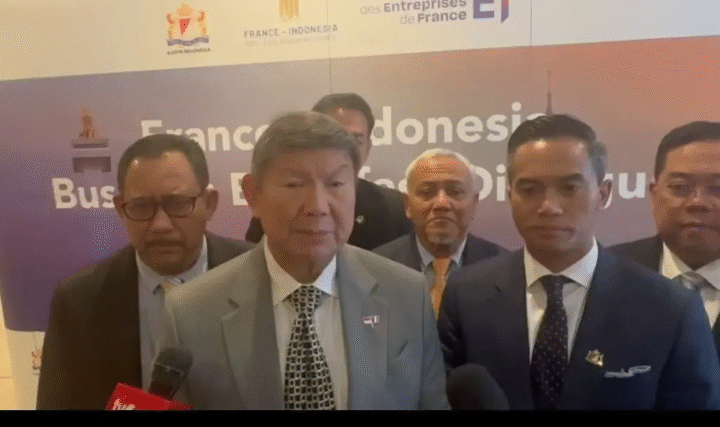
Paris, France - Indonesia's Palm Oil Industry Gains Advantage Following Conclusion of IEU-CEPA Negotiations Indonesia's palm oil commodity is set to benefit significantly following the conclusion of negotiations for the Indonesia–European Union Comprehensive Economic Partnership Agreement (IEU-CEPA), which had previously faced challenges due to environmental concerns.
“Indonesian exporters stand to benefit greatly—especially palm oil exporters,” said Hashim Djojohadikusumo, Chairman of the Advisory Board of the Indonesian Chamber of Commerce and Industry (Kadin), following the KADIN–MADEF Breakfast Forum held at the MADEF building in Paris, France, on Tuesday (July 15, 2025).
Hashim stated that under the agreement between Indonesia and the 27 European Union member states, Indonesian palm oil products will not be subject to penalties or sanctions. “There will be no fines or penalties,” he affirmed.
Previously, Indonesian crude palm oil (CPO) and its derivative products faced significant obstacles in Europe due to issues surrounding deforestation and sustainability.
The European Union had introduced regulations, such as the EU Deforestation Regulation (EUDR), which restricts imports of goods linked to deforestation, including palm oil.
Although the implementation of the EUDR is currently postponed, Indonesia has been classified as a "medium risk" country.
As a result, 3% of its exports must undergo due diligence, including providing traceability documentation to prove the products do not originate from deforested land after December 31, 2020.
“Palm oil is crucial to European industries; many products—such as soap and food—rely on palm oil as a raw material,” Hashim emphasized.
In addition to palm oil, Hashim noted that various Indonesian agricultural products will also be subject to zero tariffs once IEU-CEPA is implemented.
After 19 rounds of negotiations spanning over a decade, Indonesia and the European Union have finally reached an agreement to conclude the IEU-CEPA negotiations.
“After 10 years of negotiation, we’ve had a breakthrough. This is extremely beneficial for Indonesian businesses and the national economy. We must take full advantage of it,” said Hashim, who also serves as the President’s Special Envoy for Energy and Climate.
Hashim added that President Prabowo Subianto has agreed to several conditions requested by the EU.
“The Indonesian government was asked to meet certain requirements, and President Prabowo has agreed. The specific details will be announced by Coordinating Minister for Economic Affairs Airlangga Hartarto and the Minister of Trade. But overall, this agreement is highly advantageous for Indonesia,” he explained.
Previously, Coordinating Minister Airlangga Hartarto stated that through the IEU-CEPA agreement, approximately 80% of Indonesian products will enter the EU market with zero tariffs.
Meanwhile, Budisatrio Djiwandono—Chair of the Gerindra Party faction and Vice Chair of Commission I of the House of Representatives—commented that IEU-CEPA will significantly expand Indonesia’s access to the EU market, which comprises over 450 million consumers, and could substantially boost the current bilateral trade volume of approximately US$30 billion (IDR 480 trillion).
With zero tariffs in place, the agreement is projected to increase Indonesia’s exports to the EU by up to 50% in the coming years.
Indonesia–France Relations
Hashim also highlighted the long-standing economic relationship between Indonesia and France, dating back to the 1960s.
“As I mentioned to French business leaders earlier, the relationship between Indonesia and France has existed since the 1960s,” he said.
He cited the Jatiluhur Dam in Purwakarta, West Java—constructed by a French company with assistance from the French government—as an example.
“Jatiluhur is still in use today. The Borobudur Hotel in Jakarta was also built by the French,” he added.
Furthermore, cooperation between the two countries also extends to the defense and security sectors.
“The relationship between the French and Indonesian armed forces has existed for a long time. Indonesia still uses French military equipment to this day,” he said.
Hashim noted that in the current era, relations between French President Emmanuel Macron and Indonesian President Prabowo Subianto are particularly close.
“It could be said that among EU countries, France has one of the closest relationships with Indonesia at the head-of-state level,” he concluded.
Source: investortrust.id
National Economy
Regional Economy
National Economy
Regional Economy